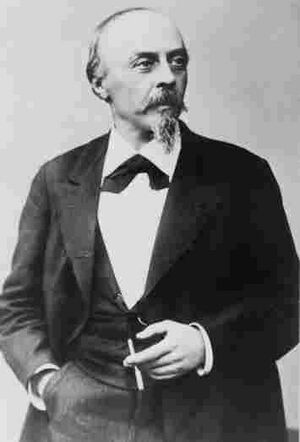Hans von Bülow
German conductor, pianist and composer (b. 8 January 1830 [N.S.] in Dresden; d. 12 February 1894 [N.S.] in Cairo), born Hans Guido von Bülow.
Bülow's musical studies began relatively late, and it was not until the age of nine that he began to receive formal piano lessons. After studying law in Leipzig and Dresden, he abandoned his legal career in 1850 to make his debut as a conductor in Zurich. In 1851, he began piano studies at Weimar with Franz Liszt, whose daughter Cosima he went on to marry in 1857. After teaching in Berlin (1855–1864) and giving piano recitals, he was appointed Hofkapellmeister in Munich in 1865, where he conducted the premieres of Wagner's Tristan und Isolde (1865) and Die Meistersinger von Nürnberg (1868).
After his wife first Cosima (Liszt's daughter) left him for Richard Wagner after eleven years of marriage in 1868, Bülow resigned his post in Munich the following year, and began to tour widely in Europe, Russia and the United States. It was in Boston in 1875 that he premiered Tchaikovsky's Piano Concerto No. 1, which the composer dedicated to him. Although closely associated with the New German School of music, Bülow also championed Tchaikovsky's works, and conducted the premiere of his Suite No. 3 in Saint Petersburg in 1885.
In 1882, Bülow married again to the actress Marie Schanzer (1857–1941), who had friendly relations with Tchaikovsky.
Dedications
As noted above, Tchaikovsky's Piano Concerto No. 1 in B-flat minor, Op. 23 (1874–75) is dedicated "à Monsieur Hans von Bulow".
Correspondence with Tchaikovsky
6 letters from Tchaikovsky to Hans von Bülow have survived, dating from 1875 to 1885, all of which have been translated into English on this website:
- Letter 406a – 1/13 July 1875, from Nizy
- Letter 413a – 21 September/3 October 1875, from Moscow
- Letter 418 – 19 November/1 December 1875, from Moscow
- Letter 443 – 1/13 February 1876, from Moscow
- Letter 907a – 5/17 September 1878, from Moscow
- Letter 2836a – 22 December 1885/3 January 1886, from Maydanovo
4 letters from Hans von Bülow to the composer, dating from 1875 to 1878, are preserved in the Tchaikovsky State Memorial Musical Museum-Reserve at Klin (a4, Nos. 377–380).
Bibliography
- Briefe 1872-1880 (1904)
- Письма Чайковского зарубежным музыкантам (1960)
- Письма к П. И. Чайковскому (1966)
- Unbekannte Briefe Peter Tschaikowskys an Hans von Bülow (1966)
- Письмо П. И. Чайковского (1966)
- Petr Il'ič Čajkovskij und Hans von Bülow (1995)
- Petr Il'ič Čajkovskij und Hans von Bülow (1998)
- Чайковский и Ганс фон Бюлов (2006)

